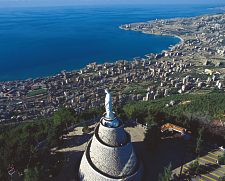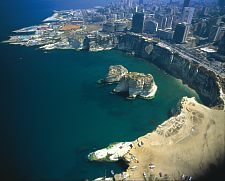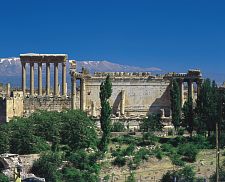|





| |
The Road to Damascus: Perdition or Rebirth?
by Elie Al-Chaer
October 23, 2005 | Visit:
AlChaer Blog
Preamble
AD 35-40 -- Saul of Tarsus sent on a mission to put an end
to a new rebel sect “the Christians.” On the road to Damascus, Saul became Paul,
the much feared defeat turned into a glorious victory and the looming end opened
the door to a new beginning. Will the road to Damascus open the door to a new
beginning in the Middle East for Georges Bush and bring him a much awaited
victory?
What goes around comes around
For the last decade or so and in the context of a different international order,
the world looked away as Syria destroyed the last vestiges of Lebanon's
independence. It happened with the blessings of the United States of America and
France and in return for Syria’s modest help with the first attack on Iraq in
1990-91. The irony is that a coalition of countries came together to liberate
Kuwait from Saddam, but handed Lebanon to Assad [on a silver plate] “in
appreciation of his help”. Fifteen years later, in the aftermath of the
September 11 attacks, the American tolerance for bargains with strong dictators
has substantially eroded and Syria has lost most of its leverage with the United
States. Hard as Damascus may have tried to maintain that Iraq was not its
affair, the ousting of the Baathist regime next door was an eerie glimpse into
what could await Syria's rulers.
On May 3, 2003, less than a month after Saddam Hussein's statue was toppled in
Baghdad, US Secretary of State Colin Powell met Syrian President Bashar Al-Assad
in Damascus. Powell solicited Assad's support for the Bush administration's road
map for Israeli-Palestinian talks; he also demanded that Assad withdraw Syria's
20,000-strong "occupying force" from Lebanon and rumors have it that he made
diplomatic threats about what might happen if Syria continued its support for “terrorists”
in Palestine and in Iraq.
Arrogance and inaptitude
Syria’s response to Powell’s demands came too late and short of expectations. By
all accounts, Syrian cooperation in the war on terrorism was more symbolic and
tactical than supportive and strategic. Furthermore, Syrian embrace of Lebanon,
which had grown suffocating over the past 30 years, reached a pinnacle in the
summer of 2004. Syrian agents were trampling on internal matters including
naturalization policies, local elections, and the education system. The
machinery of extortion had become particularly burdensome, as the Syrians helped
themselves to what could be had in Lebanon. Damascus was squeezing what it could
out of its indirect rule of Lebanon. The latter constituted a dumping ground for
Syrian labor (unable to find work at home), a vital link to the west, and a
useful staging ground for proxy attacks on Israel. It had become increasingly
difficult for the Lebanese to live with this continuing humiliation.
As if that was not enough to put Syria in the limelight of international
scrutiny, in September of 2004, Syria thumbed its nose at the world, forcing an
amendment of the Lebanese constitution and an extension of the term of its
satrap in Lebanon - President Emile Lahoud - in blatant disregard to UN Security
Council resolution 1559.
On February 14, 2005, when the former prime minister of Lebanon, Rafik Hariri,
was struck down by a huge bomb in Beirut, Lebanon would have its first
"anti-Syrian martyr" in many years. Although Hariri had not been a vocal
opponent of Syria, the opposition to Syria claimed him as its own. The outrage
in Lebanon and the Arab world broke through the old taboos of the
Syrian-Lebanese relationship; the international setting has been dramatically
transformed. France and the United States, who disagreed over Iraq, saw in
Syria's occupation of Lebanon an opportunity for common purpose. Assad's
untested son and heir, Bashar, became caught in an international storm destined
to be the trial of his regime.
To make matters worse for Assad, the Syrian-Lebanese security system became the
primary suspect in the attack on Hariri and in a series of terrorist attacks
that followed [aimed largely at Lebanon’s Christian civilians and the country’s
intellectual elites - journalists, party leaders and TV-anchors]. These would
occur amidst an international UN investigation in the assassination launched
pursuant to UN Security Council resolution 1595.
The Mehlis Report
The investigations headed by the German judge Detlev Mehlis came to the
conclusion that senior officers in the Lebanese and Syrian security and
intelligence systems may have been involved in the planning and execution of the
attack on Hariri’s convoy. Suspicions reached as high as President Bashar
Assad’s inner circle and could potentially implicate him in giving the order to
assassinate the Lebanese former PM.
Critics of Syria around the world have joined the Syrian opposition in calling
for a regime change. They argue against any positive gestures by the USA or
France towards Syria as these may embolden the weakened dictator. They also
caution that any seeming cooperation by Assad reflects merely a temporary
tactical adjustment rather than a genuine strategic change of heart, emphasizing
the tightness of the strategic vise in which Damascus finds itself.
On the other hand, many analysts advise against a military action to topple the
regime in Syria. They see a unique opportunity for the Assad regime to redeem
itself. That redemption they argue would require an unconditional pledge and
concrete steps to cooperate with the UN team (current or future) investigating
the Hariri assassination. On one hand, Syria will be expected to hand witnesses
named in the UN report by judge Mehlis - including friends and relatives of Mr.
Assad - for further investigations and if needed for trial. On the other hand,
Syria must fully end its engagement with the Palestinian groups in Lebanon and
its “entente cordiale” with Hezbollah. Cooperation with the US in cracking down
on militants in Iraq, while desirable and may have been enough 2 years ago to
gain American favor, is still necessary but no longer sufficient.
Déjà-vu?
The Syrian attitude towards the investigation and the early response by the
Assad regime and his cronies in Lebanon to the UN report of Detlev Mehlis, lead
many observers to foresee a fate for Syria similar to Iraq’s. The UN report
accuses Syria’s foreign minister, Mr. Farouk Sharaa, and other high ranking
officials in the Syrian regime of deliberately misleading the investigation.
Furthermore, Syria’s first official reaction to the report by its foreign
ministry adviser, Riyad Dawoodi, did not pledge cooperation with the
investigations. It described the report’s findings as politicized and aimed at
targeting Syria rather than finding the truth.
Syria’s friends charge that it would be a shame - and a mistake - for Assad not
to learn from the mistakes of Saddam and to ignore the possibilities he still
has to make a significant shift in the perceptions of the international
community vis-à-vis his government. They are concerned that the Syrian regime
seems to underestimate the international will and ready to test the resolve of
the American administration. They warn against delay tactics and are fearful
that a decision not to cooperate with the UN team seems to have been made in
Syria. The regime has resorted to its old tactics; rousing Syrian proxies in
Lebanon (The Palestinians and Hezbollah), to gain time and to leverage a crack
in the international solidarity behind the truth.
Pax Americana
All of these reasons make it unlikely for a dramatic change in Washington's
Syria policy towards diplomatic engagement in the immediate future. Given the
importance of the issues at stake, and given the limited prospects that anything
short of military intervention could change the Syrian regime, the question
becomes not whether threats of punitive action have already begun to nudge Syria
toward conciliation, but whether the international community is willing to
repeat with Syria the lengthy, unyielding but unfruitful saga of sanctions that
it imposed on Iraq.
The Bush administration - with the exception to its recent handling of Libya -
made it clear that the Arab world's old authoritarian order has become obsolete.
The brittle system in Damascus is in a fight to keep intact its old ways of
control. Gone is the steady hand of the old juggler, Hafez Al-Assad. Gone, too,
is the tortured US diplomacy that had courted Damascus and catered to its sense
of importance as a big player in the Fertile Crescent. Observers are on the
watch for the US administration parlance to start separating the Syrian people
from the Syrian regime. “When the fig tree puts forth leaves, summer is near”
and when that happens, it will signal the beginning of the end of the Assad
regime. Already some leaders have begun to make this separation (for example
Druze leader in Lebanon, Walid Jumblat, called for sanctions against the
culprits in the regime, not against the Syrian people).
It is doubtful that anyone in the Arab world would shed tears for Assad and his
political dynasty. Even within Syria, Damascus intellectual elites like to point
to the similarities between the Assad and Saddam regimes as “a generation of
peasant soldiers and merciless ideologues" who "took the society apart and
trumpeted their pursuit of a new social order, only to create a system of
political sterility and economic plunder.” Change is on the way in Iraq and has
begun for Syria, in Lebanon. Is it time for it to reach the “lion’s den”?
|